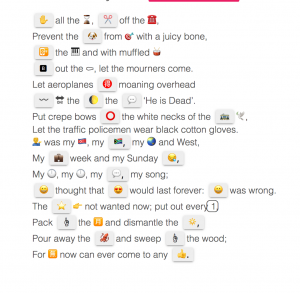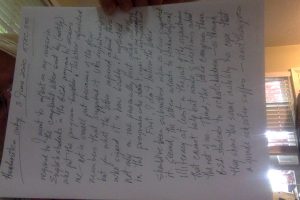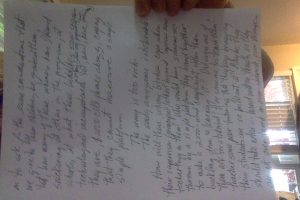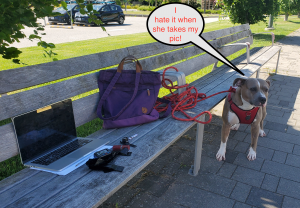So, yet another assignment that assumes I’m a PC-user or Mac Sierra user and mobile owner . . .
I checked out a number of emoji translators. I became interested in emojis briefly about 5 years ago when I learned of a business that had hired an emoji translator. I thought that was interesting; I mean, emojis are pictures. Why the need for translation?
But translation is also something that fascinates me; as Kress, 2005, asks, I’ve also wondered what might have happened had visual communication–photography, television, arguably computer screens–jumped first as mass mediums of production, would text be as dominant as it is today? Would we even need translators? (I guess so . . . ).
Kress and Bolter are both writing in the early 2000s and reading them is like reading ancient history, even though it’s not even one generation ago. Both are pre-cellphone, which has radically altered culture and both just precede massive online ‘communities’ such as Facebook, Nickelodeon, and so on that have so dramatically re-drawn lines of culture, community, and country. So their comments seem wide-eyed and naive. Bolter’s discussion of MUDS and MOOS as well as his translation of the emoticons is, well, pretty cute . . . I wonder how he would view emojis . . . (p. 74).
So here’s the capture I made of several attempts to download emojis, emoji boards and install emoji ‘alphabets’ all of them failures . . .so I put this into an emoji translator, instead. See if you can guess what it is.


I’ve put the original text below.
But back to the issue of translation. I’ve tried my hand at it, and tend to pay a lot of attention to films produced in other languages as they translate the dialogue on the bottom of the screen. Since the eye can capture and interpret the action and intonation, movement and other components allow for substantial understanding of a foreign film, it’s always curious how few words seem to be translated for the viewers. I have wondered if it was because the translators were not paid well? Then, I thought, well, really, it’s because so many other cues and clues fill in that just a few words can anchor the action.
The same is true for emojis, it seems to me. No translation is perfect; The first emoji translator was hired by a business firm in 2016 . . . and now there are emoji translators online . . . but I always find it curious that we think we can translate anything at all, really. Language is so ensconced in cultural signs that just do not translate. The word, Kalsarikannit, in Finnish, roughly translates into sitting at home in my underwear, alone, getting drunk . . . who knew? and look how many words that took to explain in English.
A friend and I argued recently about the growing dominance of emojis. I disagreed. I see them as yesterday’s culture, along with expressions like “peeps.” But emojis are also always comical. It’s hard to take a round yellow head and not think, smiley faces, or even earlier, to “Koolaid, Koolaid, tastes great” commercials, or Walmart’s price breakers.
I translated W. H. Auden’s “Stop The Clocks” poem to see what happened. It loses all its intended weight, of course . . . which makes one wonder about the potato printing assignment. It took so much work and energy and cost; little wonder not much was set down in print, or that, if you were going to spend so many hours creating one page, why not make it worth it, and embellish it?
I had a friend chastise me thoroughly once as I tore pages from a book, marked its margins up, circled, underlined, exclaimed and profaned my way through it. For him, it was sacred copy; for me it was both a tool for me to use and a space and place of exploration. Thus, I had to notate it, orient myself in it and through it, move pages around to get a fuller picture of that character that just appeared on occasional pages or that particular phrasing I could see iterating as I turned the page back and forward and could understand if I put them together . . .
For all Kress’s criticism about the valorization and control of the author on the page, I love the slip and slide of metaphor and metonomy, those “empty entities” he decries; but I love visuals, too, and wept the first time I saw the Mona Lisa.
The reader is forced to accept the author’s direction, read sequentially, in chaptered chunks (Kress, p. 13). So what? The simultaneity of an image can quite physically affect a person, at least, it can this viewer. But almost never on the computer screen, for me, with some exceptions: JR’s works underwhelm on the screen, but you can feel their powerful intent; the BBC series, Flowers, on the other hand, sickens the viewer it is so richly visual . . . it reminds me of the film, The Cook The Thief His Wife and Her Lover where the lush/rottingness of the film made you feel faint throughout. But, I have recently read Forrest Gander’s poem, BECKONED, in his collection, Be With, and lost my breath because of the drop kick his words hit me with; I still can only read his words when I have prepared myself for them, to receive them . . . words and images do that to you.
Kress’s final appeal that we “establish authority . . . even knowledge for ourselves” (p. 21) is a prophetic conclusion to what the next 15 years have brought to us, the ability to see and read in ways unimaginable just a few short years ago . . . Google still astonishes me that I can virtually walk down the street of a destination city and know it without ever being there, and when I do arrive, I can walk around like someone who has lived there for years . . .
W.H. Auden, Stop the clocks

This is the original piece, translated for this assignment. I only did part of the story. I wanted to try to Kalsarikannit . . .
Text translated
Modern Family: Did the chicken cross the road?
This show opens with Cam upset that he’s forgotten the words to a childhood song. He decides to buy a chicken to help him remember his roots.
Alex has applied for a job that requires a family interview. As usual, Phil and Claire are up to their antics and begin arguing. Luke, studying psychology at college, offers his advice on how Alex can put forward her best self.
Alex’s interview continues with Claire and Phil making their usual silly comments and trying to compete with Alex and impress the interviewer. Alex, of course, is embarrassed and tries to end the interview as quickly as possible. Alex is furious about the behaviour of her parents.
Cam’s chicken experiment does not go well, and he wants to return the bird. He is also out of chicken feed, and he asks Mitch to get more feed. We learn that Mitch enjoys the chicken. He returns home to find he has left the chicken coop open and Hennifer has disappeared.







